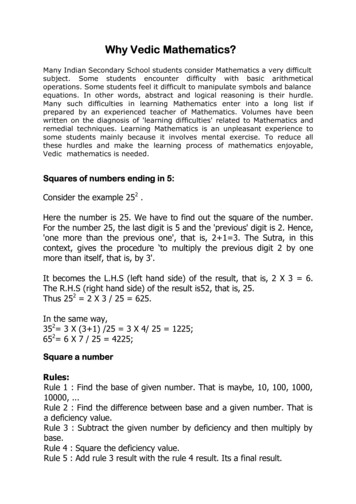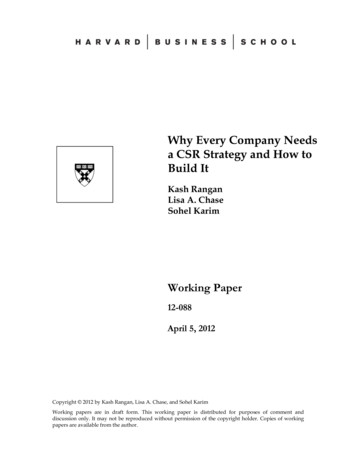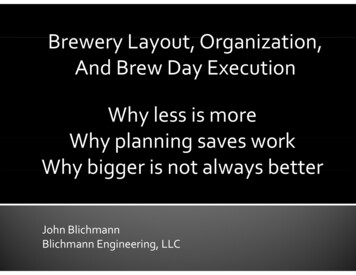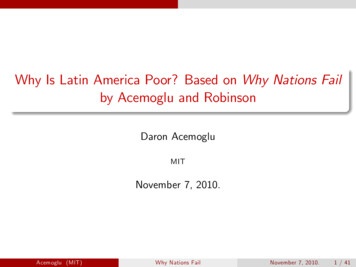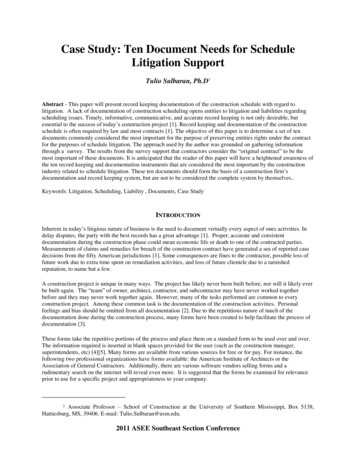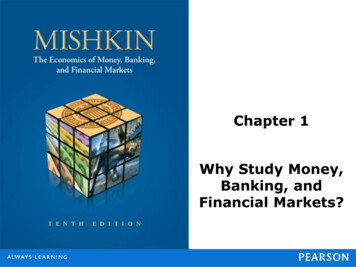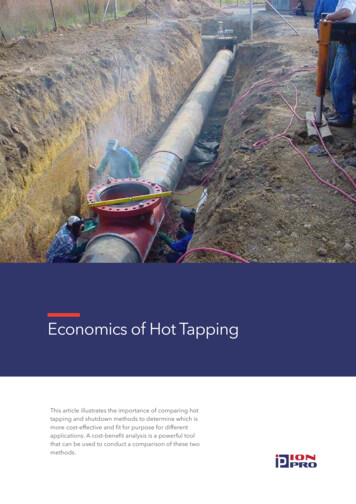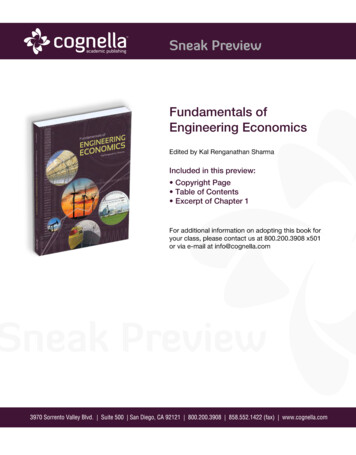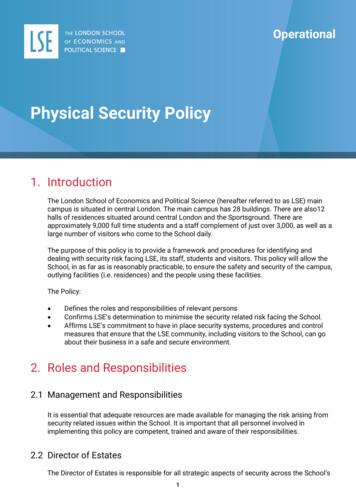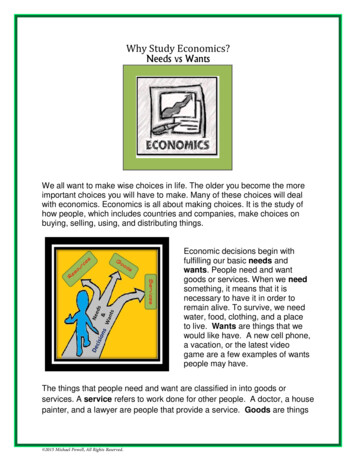
Transcription
Why Study Economics?Needs vs WantsWe all want to make wise choices in life. The older you become the moreimportant choices you will have to make. Many of these choices will dealwith economics. Economics is all about making choices. It is the study ofhow people, which includes countries and companies, make choices onbuying, selling, using, and distributing things.Economic decisions begin withfulfilling our basic needs andwants. People need and wantgoods or services. When we needsomething, it means that it isnecessary to have it in order toremain alive. To survive, we needwater, food, clothing, and a placeto live. Wants are things that wewould like have. A new cell phone,a vacation, or the latest videogame are a few examples of wantspeople may have.The things that people need and want are classified in into goods orservices. A service refers to work done for other people. A doctor, a housepainter, and a lawyer are people that provide a service. Goods are things
that are produced or manufactured, which means man-made. A car, avideo game, cheese, and a donut are all considered goods. Goods aremade with and from resources. A resource is anything that it used to makea good or service.The better we understand how and why people make choices with the useof resources, goods, and services, the better we will understand the worldaround use. This valuable knowledge will enable you to make wisereconomic decisions throughout your life.Answer each question with a complete sentence on aseparate piece of paper.1. What is economics?2. When we talk about people making economic decisions,whom else does this include?3. What does economics decisions begin with?4. What is a need?5. What is a want?6. The things people want and need are classified in what twoarea?7. What is a service?8. What is a good?9. What is a resource?10.Why is it important to study economics?
NameComprehension ChallengePer. Date:Why Study Economics?Needs vs WantsSelect the best answer for each.1.Economics is all abouta. making moneyb. making decisionsc. government controlling resourcesd. None of the Above2.The knowledge gained for studyingeconomics will enable you toa. Achieve all of your goals in lifeb. become richc. make wiser economic decisionsthroughout your lifed. None of the Above3.The things that people need and wantare classified intoa. Goods and servicesb. Wealth and Servicesc. Services and choicesd. All of the Above4. What is a need?a. anything that it used to make agood or service.b. things that are made.c. things we need to survive.d. None of the AboveSelect the correct term for 5-8.ServicesGoodsResourceWants5. things that are made.6. is anything that it used to make a good or service.7. work performed for another person.8. things people may desire to have but are notnecessary for survival.
9. List four examples of needs and wants below.Needs1.2.3.4.Wants1.2.3.4.10. List four examples of goods and services.Goods1.2.3.4.Services1.2.3.4Fill in the blank with what you believe would be the correctwords.11. Economics is the of how people, whichincludes countries and companies, make onbuying, selling, using, and distributing things.
The Four Factors of ProductionsGoods and ServicesThere is no shortage of goods and services available in the U.S. What isthe formula that leads to the creation of all of these goods and services?The creation of all goods and services are made from different resources.We call these resources that are used to make goods and services, factorsof production. It takes four factors to produce a good or service. The fourfactors of production are natural resources, labor, capital, andentrepreneurship.The first factor that is needed to produce a good or service is naturalresources. Natural resources are things found on Earth. They occurnaturally and are not man-made. Humans use these natural resources tomake other things. Animals, trees, and coal are natural resources. We useanimals to make food like cheese, milk, and many other goods.
Labor is the second factor of production. To produce a good or service,people are needed. The people that perform the work to producesomething is called labor.The third factor of production needed is capital. Capital is money and allthings that are needed to produce a good or service. A building, tools,equipment, supplies are all considered to be capital resources if they areneeded to make a good or service.The last factor of production is entrepreneurship. To produce a good orservice, you need someone to start the business or improve it. The personthat takes the risk to start a business is called an entrepreneur. Theentrepreneur combines natural resources, labor, and capital to produce agood or service.Answer each question with a complete sentence on a separatepiece of paper.1. What are the resources called that are needed to produce a good orservice?2. What are the four factors of production?3. What are natural resources?4. What is labor?5. What is capital?6. What is entrepreneurship?7. What does the entrepreneur combine in order to produce goods andservice?
NamePer. Date:Comprehension ChallengeThe Four Factors of ProductionsGoods and Services1.What are the resources called that areneeded to produce a good or service?a. Good and servicesb. Needs and wantsc. Factors of productionsd. All of the Above4. What is labor?a. Hard workb. People that only do the physical workc. People that do the work to producesomething.d. None of the Above2. How many factors of production areneeded to produce a good or service?a. 2b. 4c. 6d. 105. What could be an example of capital ifused to make something?a. Buildingsb. Machinesc. Toolsd. All of the Above3. What are natural resources?a. Animalsb. Things from nature, not man-madec. Treesd. All of the above6. What is entrepreneurship?a. Shipping products and servicesb. Starting or improving a businessc. Improving needs and wantd. All of the AboveUsing the following terms, complete the chart below.LaborProducesNeedsCapitalServicesFour Factors of ProductionGoodsNatural ResourcesWants
Scarcity and Opportunity CostThe Economic ProblemEconomics is focused on dealingwith a main problem called scarcity.Scarcity means there is not enoughof something that people want. Insociety, people have a lot of wantsand needs; these wants and needsare considered unlimited. Becausepeople’s needs and wants areunlimited, there is not enoughresources to satisfy them.Therefore, an economic problemexists; the problem is there are notenough resources, goods, andservices to meet everyone’s needsand wants.Due to the scarcity of resources, wehave to make a lot of choices. When webuy or use something, we have to makechoices. We can’t have everything wewant because there is a limited (scarce)amount things available. Every time wemake a choice to buy something wereceive a benefit, but there is also a costin making the choice. This cost is notjust monetary (money). The cost iseconomic. It comes from givingsomething up that you could have hadinstead. For instance, if you want to buya piece of fruit and have the choice ofan orange or apple but only enoughmoney for one and decide on the apple,then by choosing the apple, you gaveup a chance or missed the opportunity
of having the orange. Giving the chance or opportunity of having theorange, would be the opportunity cost. Therefore, every choice we makehas a value. In economics, the value is determined by looking at what wasgiven for each choice made. In short, an opportunity cost is the cost of themissed opportunity.Answer each question with a complete sentence on a separatepiece of paper.1. What is the main economic problem?2. What does scarcity mean?3. What is unlimited or endless?4. What is limited?5. Why can’t all of people’s needs and wants be satisfied?6. Because of the scarcity of things, what do we have to make?7. Every time we make a choice, what two things occur?8. When we make a choice, where does the economic cost comefrom?9. What does every choice have?10.How is the value of each choice we make decided?11.What does opportunity cost mean?
NameComprehension ChallengePer. Date:Scarcity and Opportunity CostThe Economic Problem1.What is the main economic problem?5. Because of the scarcity, what do wea. To many resourceshave to make?b. Not enough needsa. Choicesc. Scarcityb. Moneyd. All of the Abovec. Productsd. None of the Above2. What does scarcity mean?a. People are scaredb. There is not enough of somethingc. Too much of somethingd. None of the Above6. Every time we make an economicchoice, what two things occur?a. A profit and a loseb. A benefit and profitc. A benefit and a costd. None of the Above3. What is unlimited and endless ineconomics?a. Resourcesb. Raw materials and laborc. Needs and wantsd. Goods and services7. How is the value of each choice wemake decided?a. By looking at the benefit.b. By looking at the missed opportunityc. By looking only at the monetary costd. None of the Above4. What is limited in economics?a. Needsb. Resourcesc. Wantsd. All of the Above8. What does opportunity cost mean?a. It is what a person gives up whenthey make a choice.b. It is idea that scarcity is an economicproblem.c. It is that choices have benefits.d. None of the Above.
Comprehension ChallengeScarcity and Opportunity CostThe Economic ProblemTrue or False9. We have a limited amount resources but there is anendless amount of needs and wants10. Because of the economic problem, people andgovernments don’t have to make many decisions in how best to deal withthe scarcity.11. Every economic choice we make has a value.12. List two resources that you think are very scarce in the world?1.2.13. Give an example of an opportunity cost for something yourecently bought.a. What did you buy?b.What was the benefit (how did it make you feel good) you received frombuying the good?c.What was the economic cost of the good? Meaning what else could youhave bought instead and what did you miss out on?
NameComprehension ChallengePer. Date:Scarcity and Opportunity CostCostsWantsThe Economic ProblemScarcityChoiceThe Economic ProblemNeedsBenefitsResourcesScarcityMissed OpportunityComplete the two chart below using the appropriate terms above.
Productivity and SpecializationProductivity and specialization are two important concepts in economics.When producing goods and services, businesses desire to use limitedresources in the best way they can. The better businesses are able to usethese resources, the more likely they will make money (profit).Making a profit is the main goal of a business.Therefore, business are very concerned aboutproductivity. Productivity is the amount of goods orservices workers can produce in a period of time.The more goods and the quicker that workers areable make them, the better it is for the business.This is because the final good will cost less toproduce. The cheaper it becomes for a business toproduce a good, the more profit they will likely make.The consumer also benefits from improvedproductivity because the final good or service costless.There are several ways businesses can improve productivity. First, havingeducated and trained workers can be helpful. Educated and trainedworkers often are able to do their job quicker and more efficiently.Secondly, the investment in capital resources such as tools, equipment,and buildings can contribute to an increase in productivity. With the righttools, equipment, and work area, workers are able to get their job donequicker. Lastly, the use of technology can also improve productivity. Thecomputer is perhaps one of the best examples of how technology canimprove productivity. Computer devices are used in almost all businessestoday to make many tasks easier and more efficient for workers.Answer each question with a complete sentence on a separate piece of paper.1.2.3.4.5.6.7.When producing goods and services, what do business desire to do?What is the main goal of business?What is productivity?Why is productivity important to businesses?How do consumers benefit from companies being more productive?List three ways businesses can improve productivity?Why are educated and trained workers often more productive?
Productivity and SpecializationBusinesses are also aware of theimportance specialization. Specializationis when a business focuses on producinga specific type of goods or services. Forinstance, Coca Cola focus on sodas, Fordmakes cars, and Apple makes computerdevices. Businesses decide to specializeon one type of product because there areseveral advantages in doing so. First, thebusiness can build a reputation and createa recognizable brand. Secondly,specialization allows a business to focusits attention on what is does best.Thirdly, by specializing, the company is able to break down the productionprocess into steps and assign workers a specific task. When workers areassigned a specific job, they become more skilled at it and are able do theirjob quicker. We call the idea of workers being assigned a specialized taskor job the division of labor. These advantages from specializationencourage the more efficient use of resources and leads to an increase inproductivity. And an increase in productivity is good for business. It meansmore profit. Since there are many advantages to specializing, people andnations often specialize as well.8. What is specialization?9. What does Coca Cola specialize in?10.Why do business specialize?11.By specializing what does a business build and create?12.BY specializing what can a business focus on?13.What is a division of labor?14.What does specialization encourage?15.What does specialization lead to?Critical Thinking1. Give two examples of people specialization at work?2. What might be a disadvantage with specializing in a career or typeof good?
NamePer. Date:Comprehension ChallengeProductivity and Specialization1.When producing goods and services,what do business desire to do?a. Exploit workersb. Use limited resources in the best waythey can.c. Save resources for laterd. Take their time4.Why is productivity important tobusinesses?a. In order to make goods/services moreexpensive and increase profits.b. In order to make goods/servicescheaper and decrease profits.c. In order to make goods/servicescheaper and increase profits.d. None of the Above2.What is the main goal of business?a. Save the planetb. Lose moneyc. Make a profitd. None of the above5. How do consumers benefit fromcompanies being more productive?a. More expensive goodsb. Less expensive goodsc. Fewer goodsd. No benefit3.What is productivity?a. The amount of goods a worker canproduce in a period of time.b. The amount of money paid toworkers.c. The goods workers are unable toproduce.d. None of the Above6. How can a business improveproductivity?a. Educated and trained workersb. Tools and equipmentc. Technologyd. All of the Above7.The a key benefit of specialization isa. Increased competitionb. Increased productivityc. Increased lossesd. All of the Above
Comprehension ChallengeProductivity and SpecializationTrue and False8. Specialization allows a business to focus its attention onwhat is does best.9. Businesses specialize because they have no choice.10. Specialization encourages the efficient use of resources andleads to an increase in productivity.11. The more goods and the quicker that workers are able makethem, the better it is for the business.12. Only businesses specialize, not people or nations.Capital resourcesProductivityProfitThe division of laborSpecialization13. money a business ends up making after expenses.14. anything a business buys in order to make goodssuch as tools and equipment.15. is when a business focuses on producing a specifictype of goods or services.16. when workers are assigned a specialized task or job.17 the amount of goods or services workers can producein a period of time.
NameComprehension ChallengePer. Date:Productivity and SpecializationTechnologyGoodsServicesCapital resourcesEquipment and toolsEducated and trained workersProductivityCompete the chart below using the terms above.Using complete sentences, explain how a business can improve productivity, and whyproductivity is so important to businesses?
Answer KeysComprehension ChallengeWhy Study Economics?Needs vs Wants1. a 2. c 3. a 4.c5. goods6. resource7. service8. wants11. study, decisions or choicesComprehension ChallengeThe Four Factors ofProductionsGoods and Services1. c 2. b. 3. d 4.c 5. d 6. bComprehensionChallengeScarcity and OpportunityCostThe Economic ProblemComprehensionChallengeProductivity andSpecialization1. c 2. b 3. c 4. b 5. a 6.c 7. b 8. A9. T 10. F 11. T1. b 2. c 3. a 4. c 5. b 6. d 7. B8. T 9. F 10. T 11. T 12. F13. Profit14. Capital Resources15. specialization16. The division of labor17. productivity
What is an Economic System?Economics is all about choices, both individual and group choices. We must makechoices to provide for our needs and wants. The choices each society or nationselects leads to the creation of their type of economy. Each economic system tries toanswer the three basic questions of what should be produce, how it should beproduced, and for whom should it be produced? How they answer these questionsdetermines the kind of system they have. There are four main types of economicsystems. Each system has its strengths and weaknessesThe Traditional Economic SystemThe traditional system is the oldest economicsystem. It has existed since the first hunters andgathers emerged. It was the norm during ancienttimes. The traditional economic system still existstoday in some communities within developing nationssuch as Africa and Asia. The system is based on thetraditional way of doing things. Customs (beliefs)and past ways of doing things determine what shouldbe produced, how it should be produced, and whoshould receive the goods and services. The mainfeatures of a traditional systems are:Answer each question with a complete sentence on a1.The Barter System people mainlyseparate piece of paper.trade goods/services with each other1.What three basic questions does each economicsystem try to answer?2. How is each nation’s economic system determined?3. How many main types of economic systems arethere?4. Which economic system is the oldest system?5. In a traditional system, what determines the answerto what, how, and for whom things should beproduced?6. What are three main features of a traditionalsystems?instead of buying things.2.Subsistence Farming small familyfarms produce most of what each familyneeds to survive.3.Many goods are produced by families.4.Sharing of things in the community iscommon.
The Command Economic SystemIn a command system the government isin complete control of the economy.Individuals don’t have choices in thesystem. The government makes thechoices on what should be produced,how it should be produce, and for whom.It plans and commands all parts of theeconomy and sets the price for goodsand services. The command economy isa key feature of most communistsocieties. Cuba, North Korea, and theformer Soviet Union are examples ofcountries that have commandeconomiesThe Market Economic SystemIn a market system, also referred to as capitalism, individuals make all of the economicchoices. Individuals have the freedom on how resources will be used and owned.Individuals have freedom to decide which goods and services they want to buy andsell. The government has no say in answering economic questions of how, what, andwhom. The individual answer these questions. Because businesses and individualshave this freedom to buy and sell what they want, with no government interference, anatural market develops. In a natural market, buyers and sellers come to anagreement on what should be produced, how much should be produced, and whomthings should be produced. The key in this system is individuals answer the economicquestion, not government or traditions.7. Who is in control and makes all of the economic choices in a commandsystem?8. Who has no or little choice in a command system?9. In which type of system do individuals make all of the economic choices?10. What is market system also known as?11. Who has little say in answering the three key economic questions in a marketsystem?12. What develops because businesses have the freedom to buy and sell what theywant?In a natural market what occurs between buyers and sellers?13. What is key in a market system?
Mixed Economic SystemsMost economic systems in the world are mixed systems. They are mainly acombination of a market and a command system. In this systemindividuals and governments share in making the economic choices. Theyboth answer the economic questions of what, how, and for whom. Howmuch of a role each plays in making these economic choices varies in eachcountry.The U.S. is a mixed system. Earlier in our country’s history, individualsmade most of the economics choices, and the U.S. was closer to being amarket system. However, overtime, our government has increasinglyplayed a bigger role in making the economic choices, and we have movedfurther away from a market system. The U.S. has made numerous laws,created many government agencies, and imposed taxes, all which havehad an effect on individual economic choices and oduce?Determined byDetermined byCustoms & past waysCustoms & past waysDetermined byDetermined byGovernmentMarketDetermined byIndividualsMixedHOWtoProduce?Determined byGovernment andIndividualsGovernmentDetermined byIndividualsDetermined byGovernment andIndividualsFOR WHOMToProduce?Determined byCustoms & pastwaysDetermined byGovernmentDetermined byIndividualsDetermined byGovernment andIndividuals14. What type of economic systems do most countries have?15. Who makes the economic choices in a mixed economic system?16. How much of a role does the government and individuals play in each mixedsystem?17. What type of economic system does the U.S. have?18. Overtime, who has begun to make more of the economic choices in the U.S.economics system, individuals or government?19. What three things has the government done to control more of theeconomic choice?
NameAssessmentThe Four Economic SystemsPer. Date:Select the best answer for each question.1.What three basic questions does each economicsystem try to answer?a. When to produce, who should produce it, and,how much should be produced?b. What should be produce, how it should beproduced, and for whom should it beproduced?c. How much should be produced, whatgovernment agencies should produce it, andwhen should it be produced?d. None of the Above2.How is each nation’s economic system determined?a. by a vote of the people.b. by the key business organizations.c. by answering three key economic questions.d. All of the Above3.How many main types of economic systems arethere?a. 1b. 2c. 3d. 44.In a traditional system, what determines theanswer to what, how, and for whom things should beproduced?a. Customs and past ways.b. The businesses.c. The environment.d. None of the above.5.A main feature of a traditional system isa. The Barter Systemb. Subsistence Farmingc. Goods produced by familiesd. All of the above.6. In a market system, who makes the economicchoices and answers the three key economicquestions?a. Governmentb. Individualsc. Lawyersd. Large Corporations7.In a market system, because businesses andindividuals have the freedom to buy and sell whatthey like, with no government interference, what iscreated?a. Natural marketb. Command marketc. Regulated marketd. None of the Above8. What type of economic system do mostcountries in the world have?a. Marketb. Commandc. Traditionald. Mixed9.Who makes the economic choices in a mixedeconomic system?a. Individualsb. Governmentc. Individual and Governmentd. Businesses10.The U.S government has increased its influenceon the economy bya. Imposing taxesb. Government agenciesc. Lawsd. All of the Above
Select the best term for each.CustomsThe Barter SystemSubsistence FarmingCapitalism11. People mainly trade goods/services with each otherinstead of buying things.12. Small family farms produce most of what each familyneeds to survive.13. Beliefs and traditions14. The market system.True or False15. No longer are there traditional economic systems in the world.16. In a market system, individuals make the choices, notgovernment.17. In a mixed system, the amount of influence in whichgovernment and individuals have on economic choices is the same in allcountries.18. Over the last century, the U.S. has been moving more toward amarket system than a command system.
The Four Economic SystemsHow each Economic System is DeterminedComplete the chart below by listing who in each of the four different economicsystems determines what is produced, how it is produced, and for whom.Economic SystemsWHATtoProduce?HOWtoProduce?FOR WHOMToProduce?TraditionalDetermined byDetermined byDetermined byCommandDetermined byDetermined byDetermined byMarketDetermined byDetermined byDetermined byMixedDetermined byDetermined byDetermined by
Answer Key1. B 2. C 3. D 4. A 5. D 6. B 7. A 8. D 9. C 10. DAssessment: The Four 11. The Barter SystemEconomic Systems12. Subsistence Farming13. Customs14. Capitalism15. False16. True17. False18. False
Why Study Economics? Needs vs Wants We all want to make wise choices in life. The older you become the more important choices you will have to make. Many of these choices will deal with economics. Economics is all about making choices. It is the study of how people
